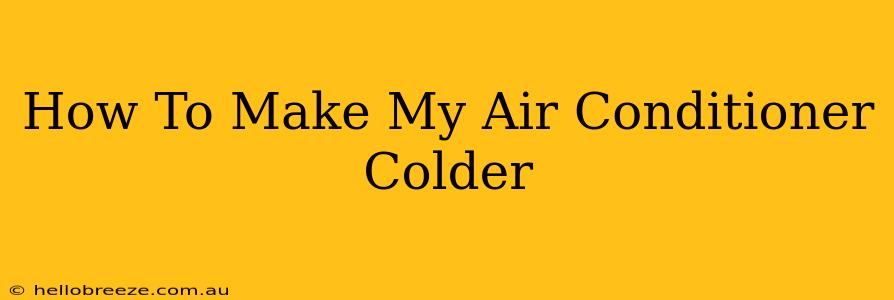Is your air conditioner not blowing as cold as you'd like? A warm house on a hot day can be incredibly uncomfortable, so let's troubleshoot why your AC isn't performing at its peak and explore ways to get that icy blast of cool air you crave. This guide will cover several methods to boost your AC's cooling power, saving you money and discomfort.
Check the Obvious: Simple Fixes for a Warmer Home
Before diving into complex solutions, let's address some easy-to-fix issues that can significantly impact your AC's cooling performance:
1. Change or Clean Your Air Filter:
This is the most crucial and often overlooked step. A dirty air filter restricts airflow, forcing your AC to work harder and reducing its cooling efficiency. A clogged filter can decrease cooling by up to 15%, leading to warmer air and higher energy bills. Check your filter monthly and replace it as needed; the frequency depends on your filter type and usage.
Pro Tip: When replacing the filter, consider upgrading to a higher-efficiency filter (like a pleated filter) for improved air quality and longer lifespan.
2. Ensure Proper Airflow:
Make sure nothing is obstructing the vents. Furniture, curtains, or even piles of clothes can block airflow, hindering your AC's ability to cool your home effectively. Keep vents clear and unobstructed for optimal performance.
3. Close Unnecessary Doors and Windows:
Sealing off unused rooms helps your AC focus its cooling power on the occupied areas, resulting in a more efficient and comfortable environment. This simple action can noticeably improve your home's temperature.
Deeper Dive: Addressing More Complex AC Issues
If the simple fixes haven't solved the problem, you may need to explore these more in-depth solutions:
4. Inspect and Clean Your Condenser Unit (Outdoor Unit):
The outdoor unit, often located near your home's exterior wall, houses the condenser coils. Over time, these coils can become clogged with dirt, debris, leaves, and other materials, reducing their ability to dissipate heat. Cleaning the coils with a garden hose or a specialized coil cleaner can drastically improve cooling performance. Remember to always disconnect the power to the unit before cleaning.
Caution: If you're uncomfortable cleaning the condenser unit yourself, it's best to call a qualified HVAC technician.
5. Check Your Refrigerant Levels:
Low refrigerant levels significantly impact cooling capacity. Refrigerant is the substance that absorbs heat within your system. Low refrigerant necessitates professional attention. Do not attempt to add refrigerant yourself; this requires specialized equipment and training. A leak in your system should be diagnosed and repaired by an HVAC technician.
6. Evaluate Your Thermostat Settings:
Ensure your thermostat is set to the correct cooling mode and is accurately reflecting your home's temperature. Consider using a programmable thermostat for optimized energy efficiency and temperature control.
When to Call a Professional
If you've tried all the above steps and your AC still isn't blowing cold enough, it's time to call a qualified HVAC technician. They possess the expertise to diagnose more complex issues, such as:
- Compressor problems: The compressor is the heart of your AC unit. Malfunctions can drastically reduce cooling power.
- Electrical problems: Faulty wiring or components can hinder the system's ability to function properly.
- Leaking ducts: Leaky ductwork can significantly reduce your AC's efficiency.
By following these tips and seeking professional help when needed, you can keep your home cool and comfortable all summer long. Remember, regular maintenance and attention to your AC unit are crucial for optimal performance and extending its lifespan.

